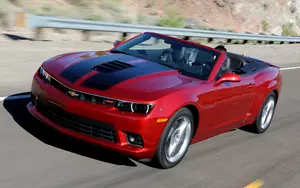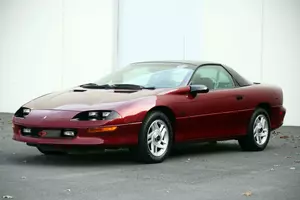
| Vehicle | Curb weight | Difference from world's smallest | Weight to power ratio | 0—60 mph acceleration ratio | Consumption ratio |
|---|---|---|---|---|---|
| 2.0 T |
1636 kg / 3607 lbs |
1211 kg (2670 lbs) heavier | 6 kg to 1 hp | - | - |
| 3.6 V6 |
1693 kg / 3733 lbs |
1268 kg (2796 lbs) heavier | 5 kg to 1 hp | - | - |
| ZL1 6.2 V8 |
1866 kg / 4115 lbs |
1441 kg (3178 lbs) heavier | 3 kg to 1 hp | - | - |
| Vehicle | 2.0 T |
|---|---|
| Curb weight |
1636 kg / 3607 lbs |
| Difference from world's smallest | 1211 kg (1211 lbs) heavier |
| Weight to power ratio | 6 kg to 1 hp |
| 0—60 mph acceleration ratio | - |
| Consumption ratio | - |
| Vehicle | 3.6 V6 |
| Curb weight |
1693 kg / 3733 lbs |
| Difference from world's smallest | 1268 kg (1268 lbs) heavier |
| Weight to power ratio | 5 kg to 1 hp |
| 0—60 mph acceleration ratio | - |
| Consumption ratio | - |
| Vehicle | ZL1 6.2 V8 |
| Curb weight |
1866 kg / 4115 lbs |
| Difference from world's smallest | 1441 kg (1441 lbs) heavier |
| Weight to power ratio | 3 kg to 1 hp |
| 0—60 mph acceleration ratio | - |
| Consumption ratio | - |

| Vehicle | Curb weight | Difference from world's smallest | Weight to power ratio | 0—60 mph acceleration ratio | Consumption ratio |
|---|---|---|---|---|---|
| 2.0 T |
1521 kg / 3354 lbs |
1096 kg (2417 lbs) heavier | 6 kg to 1 hp | - | - |
| 3.6 V6 |
1570 kg / 3462 lbs |
1145 kg (2525 lbs) heavier | 5 kg to 1 hp | - | - |
| ZL1 6.2 V8 |
1761 kg / 3883 lbs |
1336 kg (2946 lbs) heavier | 3 kg to 1 hp | - | - |
| Vehicle | 2.0 T |
|---|---|
| Curb weight |
1521 kg / 3354 lbs |
| Difference from world's smallest | 1096 kg (1096 lbs) heavier |
| Weight to power ratio | 6 kg to 1 hp |
| 0—60 mph acceleration ratio | - |
| Consumption ratio | - |
| Vehicle | 3.6 V6 |
| Curb weight |
1570 kg / 3462 lbs |
| Difference from world's smallest | 1145 kg (1145 lbs) heavier |
| Weight to power ratio | 5 kg to 1 hp |
| 0—60 mph acceleration ratio | - |
| Consumption ratio | - |
| Vehicle | ZL1 6.2 V8 |
| Curb weight |
1761 kg / 3883 lbs |
| Difference from world's smallest | 1336 kg (1336 lbs) heavier |
| Weight to power ratio | 3 kg to 1 hp |
| 0—60 mph acceleration ratio | - |
| Consumption ratio | - |

| Vehicle | Curb weight | Difference from world's smallest | Weight to power ratio | 0—60 mph acceleration ratio | Consumption ratio |
|---|---|---|---|---|---|
| 6.2 V8 |
1659 kg / 3658 lbs |
1234 kg (2721 lbs) heavier | 4 kg to 1 hp | 377 kg/s (831 lbs/s) |
130 kg/L (287 lbs/L) |
| 2.0 |
1539 kg / 3393 lbs |
1114 kg (2456 lbs) heavier | 6 kg to 1 hp | 275 kg/s (606 lbs/s) |
192 kg/L (423 lbs/L) |
| 3.6 V6 |
1558 kg / 3435 lbs |
1133 kg (2498 lbs) heavier | 5 kg to 1 hp | 354 kg/s (781 lbs/s) | - |
| ZL1 6.2 V8 |
1789 kg / 3945 lbs |
1364 kg (3008 lbs) heavier | 3 kg to 1 hp | - | - |
| Vehicle | 6.2 V8 |
|---|---|
| Curb weight |
1659 kg / 3658 lbs |
| Difference from world's smallest | 1234 kg (1234 lbs) heavier |
| Weight to power ratio | 4 kg to 1 hp |
| 0—60 mph acceleration ratio | 377 kg/s (831 lbs/s) |
| Consumption ratio |
130 kg/L (287 lbs/L) |
| Vehicle | 2.0 |
| Curb weight |
1539 kg / 3393 lbs |
| Difference from world's smallest | 1114 kg (1114 lbs) heavier |
| Weight to power ratio | 6 kg to 1 hp |
| 0—60 mph acceleration ratio | 275 kg/s (606 lbs/s) |
| Consumption ratio |
192 kg/L (423 lbs/L) |
| Vehicle | 3.6 V6 |
| Curb weight |
1558 kg / 3435 lbs |
| Difference from world's smallest | 1133 kg (1133 lbs) heavier |
| Weight to power ratio | 5 kg to 1 hp |
| 0—60 mph acceleration ratio | 354 kg/s (781 lbs/s) |
| Consumption ratio | - |
| Vehicle | ZL1 6.2 V8 |
| Curb weight |
1789 kg / 3945 lbs |
| Difference from world's smallest | 1364 kg (1364 lbs) heavier |
| Weight to power ratio | 3 kg to 1 hp |
| 0—60 mph acceleration ratio | - |
| Consumption ratio | - |

| Vehicle | Curb weight | Difference from world's smallest | Weight to power ratio | 0—60 mph acceleration ratio | Consumption ratio |
|---|---|---|---|---|---|
| 2.0 |
1659 kg / 3658 lbs |
1234 kg (2721 lbs) heavier | 6 kg to 1 hp | 286 kg/s (631 lbs/s) |
205 kg/L (452 lbs/L) |
| 6.2 V8 |
1769 kg / 3901 lbs |
1344 kg (2964 lbs) heavier | 4 kg to 1 hp | 402 kg/s (886 lbs/s) |
154 kg/L (340 lbs/L) |
| 3.6 V6 |
1693 kg / 3733 lbs |
1268 kg (2796 lbs) heavier | 5 kg to 1 hp | - | - |
| Vehicle | 2.0 |
|---|---|
| Curb weight |
1659 kg / 3658 lbs |
| Difference from world's smallest | 1234 kg (1234 lbs) heavier |
| Weight to power ratio | 6 kg to 1 hp |
| 0—60 mph acceleration ratio | 286 kg/s (631 lbs/s) |
| Consumption ratio |
205 kg/L (452 lbs/L) |
| Vehicle | 6.2 V8 |
| Curb weight |
1769 kg / 3901 lbs |
| Difference from world's smallest | 1344 kg (1344 lbs) heavier |
| Weight to power ratio | 4 kg to 1 hp |
| 0—60 mph acceleration ratio | 402 kg/s (886 lbs/s) |
| Consumption ratio |
154 kg/L (340 lbs/L) |
| Vehicle | 3.6 V6 |
| Curb weight |
1693 kg / 3733 lbs |
| Difference from world's smallest | 1268 kg (1268 lbs) heavier |
| Weight to power ratio | 5 kg to 1 hp |
| 0—60 mph acceleration ratio | - |
| Consumption ratio | - |

| Vehicle | Curb weight | Difference from world's smallest | Weight to power ratio | 0—60 mph acceleration ratio | Consumption ratio |
|---|---|---|---|---|---|
| 6.2 V8 |
1920 kg / 4234 lbs |
1495 kg (3297 lbs) heavier | 5 kg to 1 hp | 362 kg/s (798 lbs/s) |
147 kg/L (324 lbs/L) |
| Vehicle | 6.2 V8 |
|---|---|
| Curb weight |
1920 kg / 4234 lbs |
| Difference from world's smallest | 1495 kg (1495 lbs) heavier |
| Weight to power ratio | 5 kg to 1 hp |
| 0—60 mph acceleration ratio | 362 kg/s (798 lbs/s) |
| Consumption ratio |
147 kg/L (324 lbs/L) |

| Vehicle | Curb weight | Difference from world's smallest | Weight to power ratio | 0—60 mph acceleration ratio | Consumption ratio |
|---|---|---|---|---|---|
| 6.2 V8 |
1795 kg / 3958 lbs |
1370 kg (3021 lbs) heavier | 4 kg to 1 hp | 352 kg/s (776 lbs/s) |
137 kg/L (302 lbs/L) |
| 7.0 V8 |
1732 kg / 3819 lbs |
1307 kg (2882 lbs) heavier | 3 kg to 1 hp | - | - |
| Vehicle | 6.2 V8 |
|---|---|
| Curb weight |
1795 kg / 3958 lbs |
| Difference from world's smallest | 1370 kg (1370 lbs) heavier |
| Weight to power ratio | 4 kg to 1 hp |
| 0—60 mph acceleration ratio | 352 kg/s (776 lbs/s) |
| Consumption ratio |
137 kg/L (302 lbs/L) |
| Vehicle | 7.0 V8 |
| Curb weight |
1732 kg / 3819 lbs |
| Difference from world's smallest | 1307 kg (1307 lbs) heavier |
| Weight to power ratio | 3 kg to 1 hp |
| 0—60 mph acceleration ratio | - |
| Consumption ratio | - |

| Vehicle | Curb weight | Difference from world's smallest | Weight to power ratio | 0—60 mph acceleration ratio | Consumption ratio |
|---|---|---|---|---|---|
| 6.2 V8 |
1920 kg / 4234 lbs |
1495 kg (3297 lbs) heavier | 5 kg to 1 hp | 362 kg/s (798 lbs/s) |
147 kg/L (324 lbs/L) |
| Vehicle | 6.2 V8 |
|---|---|
| Curb weight |
1920 kg / 4234 lbs |
| Difference from world's smallest | 1495 kg (1495 lbs) heavier |
| Weight to power ratio | 5 kg to 1 hp |
| 0—60 mph acceleration ratio | 362 kg/s (798 lbs/s) |
| Consumption ratio |
147 kg/L (324 lbs/L) |

| Vehicle | Curb weight | Difference from world's smallest | Weight to power ratio | 0—60 mph acceleration ratio | Consumption ratio |
|---|---|---|---|---|---|
| 6.2 V8 |
1795 kg / 3958 lbs |
1370 kg (3021 lbs) heavier | 4 kg to 1 hp | 352 kg/s (776 lbs/s) |
137 kg/L (302 lbs/L) |
| 3.6 V6 |
1700 kg / 3749 lbs |
1275 kg (2812 lbs) heavier | 5 kg to 1 hp | - | - |
| Vehicle | 6.2 V8 |
|---|---|
| Curb weight |
1795 kg / 3958 lbs |
| Difference from world's smallest | 1370 kg (1370 lbs) heavier |
| Weight to power ratio | 4 kg to 1 hp |
| 0—60 mph acceleration ratio | 352 kg/s (776 lbs/s) |
| Consumption ratio |
137 kg/L (302 lbs/L) |
| Vehicle | 3.6 V6 |
| Curb weight |
1700 kg / 3749 lbs |
| Difference from world's smallest | 1275 kg (1275 lbs) heavier |
| Weight to power ratio | 5 kg to 1 hp |
| 0—60 mph acceleration ratio | - |
| Consumption ratio | - |

| Vehicle | Curb weight | Difference from world's smallest | Weight to power ratio | 0—60 mph acceleration ratio | Consumption ratio |
|---|---|---|---|---|---|
| 3.8 i V6 |
1880 kg / 4145 lbs |
1455 kg (3208 lbs) heavier | 9 kg to 1 hp | 232 kg/s (512 lbs/s) | - |
| 5.7 i V8 |
1580 kg / 3484 lbs |
1155 kg (2547 lbs) heavier | 5 kg to 1 hp | 304 kg/s (670 lbs/s) |
132 kg/L (291 lbs/L) |
| 3.4 i V6 |
1475 kg / 3252 lbs |
1050 kg (2315 lbs) heavier | 9 kg to 1 hp | - |
139 kg/L (306 lbs/L) |
| 5.7 i V8 Z28 |
1570 kg / 3462 lbs |
1145 kg (2525 lbs) heavier | 5 kg to 1 hp | 275 kg/s (606 lbs/s) | - |
| SS 5.7 i V8 |
1605 kg / 3539 lbs |
1180 kg (2602 lbs) heavier | 5 kg to 1 hp | 328 kg/s (723 lbs/s) |
119 kg/L (262 lbs/L) |
| Vehicle | 3.8 i V6 |
|---|---|
| Curb weight |
1880 kg / 4145 lbs |
| Difference from world's smallest | 1455 kg (1455 lbs) heavier |
| Weight to power ratio | 9 kg to 1 hp |
| 0—60 mph acceleration ratio | 232 kg/s (512 lbs/s) |
| Consumption ratio | - |
| Vehicle | 5.7 i V8 |
| Curb weight |
1580 kg / 3484 lbs |
| Difference from world's smallest | 1155 kg (1155 lbs) heavier |
| Weight to power ratio | 5 kg to 1 hp |
| 0—60 mph acceleration ratio | 304 kg/s (670 lbs/s) |
| Consumption ratio |
132 kg/L (291 lbs/L) |
| Vehicle | 3.4 i V6 |
| Curb weight |
1475 kg / 3252 lbs |
| Difference from world's smallest | 1050 kg (1050 lbs) heavier |
| Weight to power ratio | 9 kg to 1 hp |
| 0—60 mph acceleration ratio | - |
| Consumption ratio |
139 kg/L (306 lbs/L) |
| Vehicle | 5.7 i V8 Z28 |
| Curb weight |
1570 kg / 3462 lbs |
| Difference from world's smallest | 1145 kg (1145 lbs) heavier |
| Weight to power ratio | 5 kg to 1 hp |
| 0—60 mph acceleration ratio | 275 kg/s (606 lbs/s) |
| Consumption ratio | - |
| Vehicle | SS 5.7 i V8 |
| Curb weight |
1605 kg / 3539 lbs |
| Difference from world's smallest | 1180 kg (1180 lbs) heavier |
| Weight to power ratio | 5 kg to 1 hp |
| 0—60 mph acceleration ratio | 328 kg/s (723 lbs/s) |
| Consumption ratio |
119 kg/L (262 lbs/L) |

| Vehicle | Curb weight | Difference from world's smallest | Weight to power ratio | 0—60 mph acceleration ratio | Consumption ratio |
|---|---|---|---|---|---|
| 3.4 i V6 |
1470 kg / 3241 lbs |
1045 kg (2304 lbs) heavier | 9 kg to 1 hp | - |
123 kg/L (271 lbs/L) |
| 5.7 i V8 Z28 |
1600 kg / 3528 lbs |
1175 kg (2591 lbs) heavier | 5 kg to 1 hp | 308 kg/s (679 lbs/s) | - |
| 5.7 i V8 |
1563 kg / 3446 lbs |
1138 kg (2509 lbs) heavier | 5 kg to 1 hp | - | - |
| 3.8 i V6 |
1590 kg / 3506 lbs |
1165 kg (2569 lbs) heavier | 8 kg to 1 hp | 196 kg/s (432 lbs/s) | - |
| Vehicle | 3.4 i V6 |
|---|---|
| Curb weight |
1470 kg / 3241 lbs |
| Difference from world's smallest | 1045 kg (1045 lbs) heavier |
| Weight to power ratio | 9 kg to 1 hp |
| 0—60 mph acceleration ratio | - |
| Consumption ratio |
123 kg/L (271 lbs/L) |
| Vehicle | 5.7 i V8 Z28 |
| Curb weight |
1600 kg / 3528 lbs |
| Difference from world's smallest | 1175 kg (1175 lbs) heavier |
| Weight to power ratio | 5 kg to 1 hp |
| 0—60 mph acceleration ratio | 308 kg/s (679 lbs/s) |
| Consumption ratio | - |
| Vehicle | 5.7 i V8 |
| Curb weight |
1563 kg / 3446 lbs |
| Difference from world's smallest | 1138 kg (1138 lbs) heavier |
| Weight to power ratio | 5 kg to 1 hp |
| 0—60 mph acceleration ratio | - |
| Consumption ratio | - |
| Vehicle | 3.8 i V6 |
| Curb weight |
1590 kg / 3506 lbs |
| Difference from world's smallest | 1165 kg (1165 lbs) heavier |
| Weight to power ratio | 8 kg to 1 hp |
| 0—60 mph acceleration ratio | 196 kg/s (432 lbs/s) |
| Consumption ratio | - |